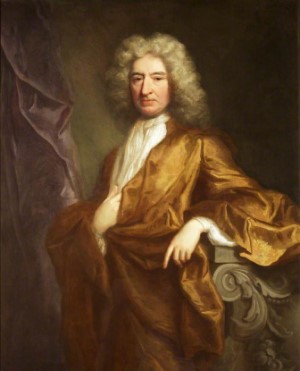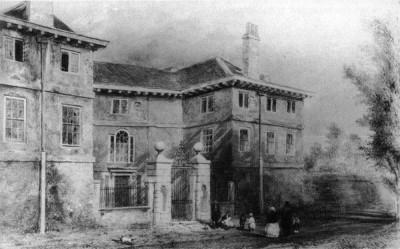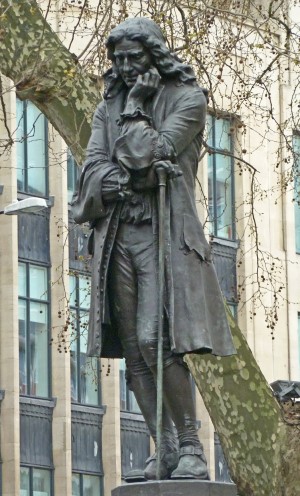Edward Colston
Best known as: English merchant and philanthropist
Born: November 2, 1636 in Bristol, England
Died: October 11, 1721 in Mortlake, Surrey, England
Resting place: All Saints' Church, Bristol, England
Biography:
Edward Colston was born in Bristol, England in 1636. His parents were named William and Sarah, and he was the oldest of 11 children. The family had lived in Bristol since the 1300s. William Colston was a wealthy and successful merchant, as well as alderman and sheriff. He lost these offices, however, during the English Civil War (1642-1651). Growing up, Edward split his time between Bristol and his family's estate in the nearby village of Winterbourne. In the 1640s the family moved to London, and Edward attended school there.
In 1654, Edward became an apprentice with the Mercers' Company of London. Not much is known about him as a young adult, other than the fact that he became a full-fledged merchant in 1673. His business involved trading with Spain, Portugal, Italy, the Netherlands, Africa, and the Americas. He dealt in such goods as silk, textiles, oil, wine, and cod. In March 1680 he became a member of the Royal African Company, which sent ships to the West Coast of Africa to trade gold, silver, sugar, ivory, and slaves.
During the 1680s, Colston mvoed back to Bristol and began to take an active role in civic life. In 1683 he became a member of the Society of Merchant Venturers, and in 1684 he became a member of the St. Werburgh parish church in Bristol. In 1689 he moved to a mansion called Cromwell House in Mortlake, Surrey, where he planted orange trees, evergreens, and shrubs. He never married or had children, but his sister Ann and his neice helped manage the household. During this time, Colston continued his work as a merchant, commuting to London via a horse and carriage. In 1689 he became deputy governor of the Royal African Company. In this role, he helped to decide on the company's trade routes, the goods they exchanged for slaves, and the wages paid to ship captains. He left the company in 1692 and continued trading on his own. He also owned a sugar refinery and earned additional income from money lending.
In 1708 Colston retired from being a merchant. Between the wealth he had inherited from his father and his own business ventures and investments, he had accumulated a large fortune. He did not leave many personal or business records behind, so it is impossible to tell what percentage of his wealth came from each type of business. What is known is that he spent a large portion of his wealth on various charitable causes, the primary reason why he is remembered. Colston had continued to take an interest in his hometown over the years and founded and donated to numerous schools, churches, hospitals, and poorhouses in Bristol and the surrounding area. For example, he founded Colston's School, which opened in 1710, as well as the Temple School for Boys, which opened in 1711. He also funded numerous scholarships for individual students. After his death a board of trustees continued his legacy, opening the Colston Girls' School in 1891.
Colston's father had died in 1681 and his mother in 1701, and he dedicated a monument to them at All Saints' Church in the city center of Bristol. He also donated money for programming, renovations, and landscaping at this church and various others. Every year on his birthday, a sermon was read at Bristol Cathedral, which the students at his schools attended.
Colston was a devout member of the Church of England and was conservative in matters of politics and religion, perhaps motivated by the turbulence that he had experienced while growing up during the Civil War. He was a member of the Society for the Propagation of Christian Knowledge and the Society for the Propagation of the Gospel. His philanthropy reflected his generosity as well as his religious and political beliefs. Colston implemented strict rules for the students at his schools, requiring them to attend classes from 7:00 a.m. to 5:00 p.m. and pray and read the Bible multiple times a day. Residents of his poorhouses were required to be well-behaved and to abstain from drinking. He also sponsored a program to have sermons read at the city jail.
From 1710 to 1713 Colston served in Parliament as a Tory. He was initially reluctant to enter politics because at 74 he felt he was too old, but his Tory friends encouraged him to serve because he was so popular due to his philanthropy. During his three years in office, he gave a few speeches and presented petitions to parliament on behalf of his constituents. He and his friends set up a club called the Loyal Society, which held dinners and parades every year in his honor.
Colston died at his home in 1721 at age 84. Beneficiaries of his charities, including students from his schools and residents of his poorhouses, participated in the funeral procession. He was buried in a vault at All Saints' Church with his parents and siblings. He bequeathed some of his wealth to his nephews, nieces, and cousins and of course left a large amount of wealth to his various charitable ventures. Several organizations were formed after his death to continue his legacy, including the Colston Society, Dolphin Society, Grateful Society, and Anchor Society.
Personality:
It is clear from Colston's actions that he was generous and genuinely wanted to use his wealth to help the community, as well as to encourage people to live according to traditional moral values. He appears to have been strict, meticulous, and organized. He is also said to have been proud, stubborn, and determined.
Fun facts:
- The Colston bun, a type of sweet bread containing dried fruit and spices, is named after him.
- In his will, Colston provided precise instructions for his funeral, specifying how many horses and carriages to hire and for how many days, what the horsemen and coachmen would wear, and how much everything would cost.
Quotes:
- "Every helpless widow is my wife and her distressed orphans my children."
Pictures:

Portrait of Colston by Jonathan Richardson

Colston's home, Cromwell House, in Mortlake

Statue of Colston in Bristol
